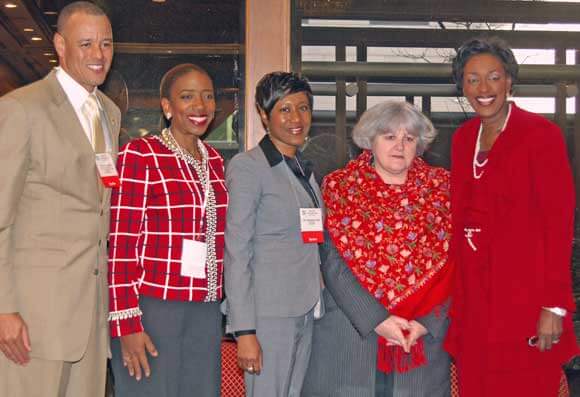Delta Sigma Theta Sorority, Inc. held its Delta Day at the United Nations March 4.
The theme for this year was “Empowering Women and Girls Globally Through Access and Participation in Education, Training, Science, Technology and Equal Access to Full Employment and Decent Work.”
Delta Day was opened with a reception at the Paul Weiss, Rifkind, Wharton & Garrison LLP firm 1285 Avenue of the Americas honoring Gillian Sorensen, senior advisor U.N. Foundation. The following Delta Day was held at the U.N. Plaza Millennium Hotel with an 8:30 breakfast and welcome addresses by Dessima Williams, ambassador and permanent representative of Grenada to the U.N., and Cynthia B. McIntyre, national president, Delta Sorority.
The morning continued with two panel discussions. The first was titled Fireside Chat #1: “Examining the Issues and Opportunities Involved with Access to STEM Education of Women and Girls in Underrepresented Area in the U.S. and Globally,” with moderator Carla Harris, member, National Social Action Commission and panelists Gwendolyn E. Boyd, Tanneshia Kirby, executive, GE Energy, Nathalie Leroy, PhD, deputy chief, U.N. Academic Impact, and Carl Mack, executive director, National Society of Black Engineers.
The second, Fireside Chat #2: “Examining the Economic Opportunities and Challenges for employment in STEM Related Fields for Women and Girls in the U.S. and Globally,” moderated by Tanya Spencer, Ecomagination director, GE Corporation, with panelists, Kimberly Bankston, executive, GE Corporate, Pat Pearman, executive GE Corporate, Tina Taylor, executive GE Corporate, and Marsha Henderson, MCPR, assistant commissioner for Women’s Health, Food and Drug Administration.
The afternoon followed with Thematic Remarks: “Increasing the Participation of Women in Science and Engineering” with Siddika Demir, president, Society of Women Engineers, and Dr. Marcella Maxwell, member, National Social Action Commission, who introduced keynote speaker Martha Daniel, president and CEO, IMRI-Technology and Engineering Solutions.
Daniel said, “The economy as a whole as we experience a series of critical national security economical terms in the United States and in various places around the world, are also experience crash mode crisis in our education system in America, that what I’m hearing this morning. But in globalization in this new Cyber Age, the rapid movement in information through technology, innovation, it has evolving implications on our work force; the work force has become more and more information intensive and less labor intensive. So it important for us to understand the references of STEM Education…”
She added, “…this Cyber Age, this age of information, has changed our culture, it has changed our language, it has even changed the way we think, and that is why we’re sitting here today…”



























